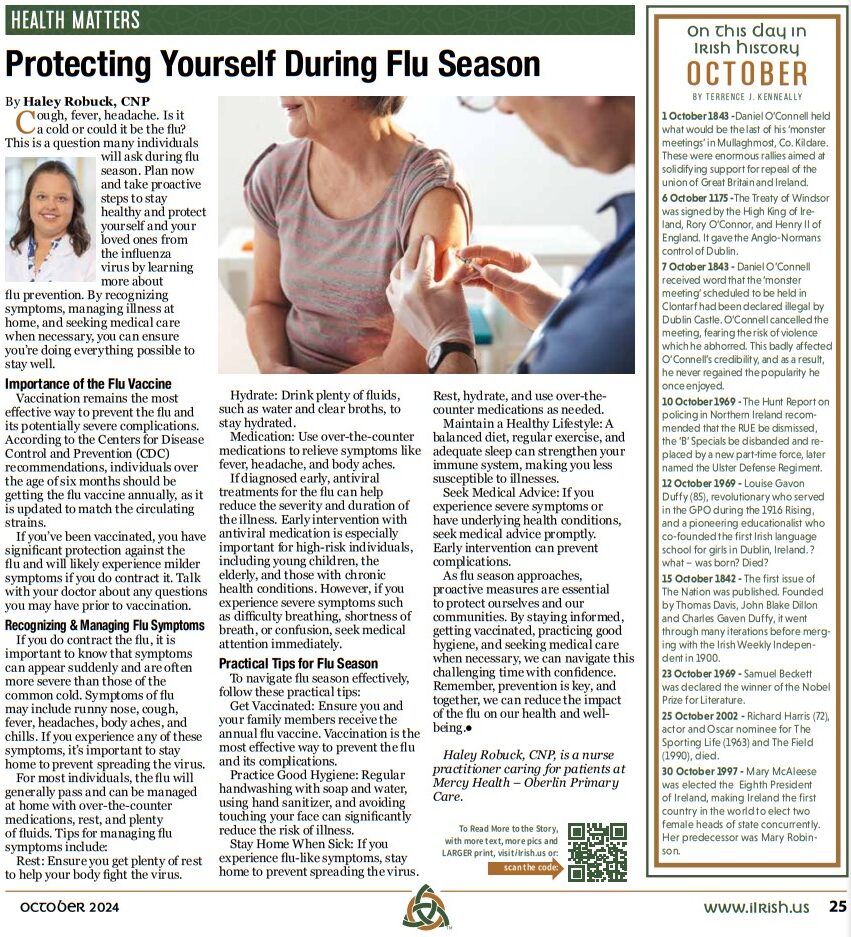Protecting Yourself During Flu Season

By Haley Robuck, CNP
Is It a Cold or the Flu?
Cough, fever, headache—could it be the flu, or is it just a cold? This is a common question during flu season. Planning ahead and taking proactive steps can help you stay healthy and protect yourself and your loved ones from the influenza virus. By recognizing symptoms, managing illness at home, and seeking medical care when necessary, you can navigate flu season effectively.
The Importance of the Flu Vaccine
Vaccination remains the most effective way to prevent the flu and its potentially severe complications.
- CDC Recommendations: The Centers for Disease Control and Prevention (CDC) advises that everyone over six months of age should receive the flu vaccine annually. This is because the vaccine is updated each year to match circulating strains.
- Protection Benefits: Being vaccinated provides significant protection against the flu and often results in milder symptoms if you do contract the virus.
- Consult Your Doctor: Speak with your healthcare provider if you have questions about the flu vaccine.
Recognizing and Managing Flu Symptoms
Flu Symptoms
Flu symptoms typically appear suddenly and are more severe than those of a common cold. They may include:
- Runny nose.
- Cough.
- Fever.
- Headaches.
- Body aches.
- Chills.
If you experience these symptoms, it’s crucial to stay home to avoid spreading the virus.
Managing Flu at Home
For most individuals, the flu can be managed at home with simple steps:
- Rest: Get plenty of rest to allow your body to fight the virus.
- Hydrate: Drink fluids like water and clear broths to stay hydrated.
- Medication: Use over-the-counter medications to relieve symptoms such as fever, headache, and body aches.
Antiviral Treatments
If diagnosed early, antiviral medications can help reduce the severity and duration of the flu. This is particularly important for high-risk groups, including:
- Young children.
- The elderly.
- Those with chronic health conditions.
If you experience severe symptoms such as difficulty breathing, shortness of breath, or confusion, seek medical attention immediately.
Practical Tips for Flu Season
To stay healthy during flu season, follow these practical tips:
- Get Vaccinated: Ensure you and your family members receive the annual flu vaccine.
- Practice Good Hygiene: Wash your hands regularly, use hand sanitizer, and avoid touching your face.
- Stay Home When Sick: If you have flu-like symptoms, stay home to prevent spreading the virus.
- Maintain a Healthy Lifestyle: Eat a balanced diet, exercise regularly, and get adequate sleep to boost your immune system.
- Seek Medical Advice: If you have severe symptoms or underlying health conditions, consult a healthcare provider promptly.
Prevention is Key
As flu season approaches, proactive measures are essential to protect ourselves and our communities. By staying informed, getting vaccinated, practicing good hygiene, and seeking medical care when necessary, we can reduce the impact of the flu and ensure our health and well-being.
About the Author
Haley Robuck, CNP, is a nurse practitioner caring for patients at Mercy Health – Oberlin Primary Care.






